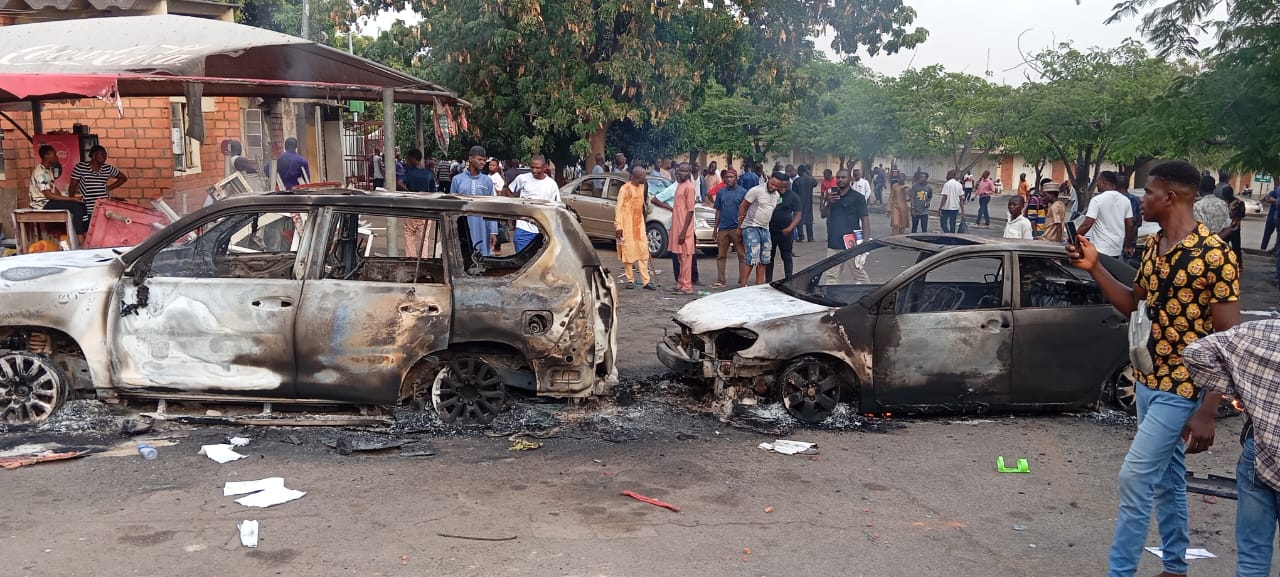Death has become unnervingly cheap in Nigeria. Incredibly, life manages to be even cheaper.
In many parts of the country, lives are being snuffed out of people with alarming regularity.
Every day, people are being snatched and led to their deaths like sheep to a slaughter.
On 12th March, the red mist descended on popular Wuse Market in Abuja, when a hastily convened mobile court which tries environmental offenders found a teenage hawker liable for a couple of environmental offences.
- Terrorism sponsors: Nigeria needs more list
- Nigeria remains neutral in Russia, Ukraine conflict – Tuggar
He was duly convicted and while he was being taken away by men of the Nigeria Correctional Service, the familiar Nigerian suspicion and fear of the agents of state set in to send him scampering down from the vehicle, upon which he quickly took to his heels.
The prison wardens briefly gave chase before fatally shooting him to make him one more entry on the list of those killed rather recklessly by agents of state.
The bullet fired by the correctional services official more than snuffed the life out of the hapless teenage hawker for whom life was already tough peddling his wares. It also set off a firestorm in the market, during which no less than ten shops and eight cars were burnt down by angry youths. Over 1 billion Naira was lost as the market was temporarily shut down.
For using a sledgehammer to kill a fly, law enforcement in Abuja did not just result in an unquantifiable loss of life, at least a billion was also lost in money. With time, the damage done to the system will become apparent.
The killing machine also made a stop in Taraba State, whetting its appetite on the stone of festering ethnic crisis in a state where different ethnic groups are locked in a panicked competition which precludes peaceful co-existence.
Also on 12th March, a bus carrying about fifteen passengers from Zaki Biam to Maihula in Donga Local Government Area of Taraba State was ambushed by criminals. While the driver managed to escape, the bodies of about nine of his passengers were later recovered. The abduction and consequent killing of the passengers have been chalked down to reprisals for previous clashes between Ichen and Tiv ethnic groups in the state.
Gradually, Nigeria is becoming an open market of bodies and body parts; a market marked by the conspiracy of many criminals in the country, the complicity of those who aid them and the complacency of law enforcement.
They abduct and kill as if Nigeria has stopped being a country where human life is the gift of gifts that should never be taken away save under the strictest stricture of the Constitution. When people are indiscriminately or systematically killed and nothing is done, it won’t take a soothsayer to know that there will be more death.
In Nigeria, those who kill and those who aid them make up Nigeria’s hidden offenders, together with those who condone them.
The teenage hawker in Wuse Market must have come to Abuja from his village in one of Nigeria’s thirty-six states, lured by the sirens of Abuja’s fabled but fatal green pastures. Having learnt the hard way that the roads in Abuja are not paved with gold, he must have taken to hawking to avoid returning to his village, which may be under the iron fist of terrorists. This was until the mobile court came and pronounced judgment on him, a judgment that was swiftly executed in a country where the wheels of justice grind scandalously slowly.
The law kills In Nigeria, sometimes literally. But until it does, all other acts of killing are unconstitutional, illegal, and unforgivable.
The killers lurking in some local government areas of Taraba State don’t seem to know this. To their minds, the law cannot enjoy a monopoly of killings. Rev. Joseph Abah, a pastor of the African Church and his wife and his thirteen-month-old son are still missing. Given the cruelty of the attackers, it is improbable that the child survived, which may have been a more merciful fate given the circumstances. In many Nigerian states, a multiplicity of ethnic groups have given rise to multitudinous conflicts fueled by ancient animosities over scant resources and relevance.
Death does not discriminate. The experience of the state has shown that many of those who remorselessly and indiscriminately dispense death are themselves afraid of death. Their cowardice expresses itself in the ease with which they unburden the weight of their cowardice on others, somehow drawing pleasure from that which they fear the most.
To protect its monopoly of death, Nigeria must prey on the fears of those who dish death but not under the hand of the state. Bringing them nose to nose with that which they fear most; touching it but not exactly succumbing to it in a way that only the law can, may make them rethink their crimes.
A country that not only condones callous criminals but deigns to share its monopoly of death with them is surely complicit in their crimes.
Ike Willie-Nwobu wrote via [email protected]

 Join Daily Trust WhatsApp Community For Quick Access To News and Happenings Around You.
Join Daily Trust WhatsApp Community For Quick Access To News and Happenings Around You.


